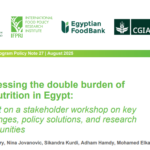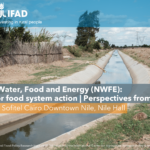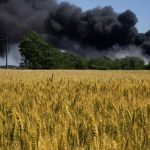Key messages Parliamentarians, researchers, and development practitioners shared perspectives on the double burden of malnutrition in Egypt in roundtable discussions. Infrastructure gaps and policy and research strategy fragmentation are highlighted as challenges to accessibility of healthy food. Aggressive ads/media environment and inefficient nutrition education programs are regarded as negatively impacting consumer behavior. Economic factors are widely identified as a major driver of malnutrition. Recommended solutions include raising nutrition literacy, transitioning from food subsidies to vouchers, improving nutrition services infrastructure, taxing unhealthy foods, and fortifying staple foods. Participants called for continued dialogue between researchers and policymakers.
Policy Workshop Advancing Policy Innovation for Social Protection, Food, and Water in Egypt
The International Food Policy Research Institute (IFPRI) and the International Water Management Research Institute (IWMI) are convening a policy workshop that will gather government agencies engaged in shaping Egypt’s food, water and social protection policies.
The struggle to get food aid from Egypt to Gaza: Insights from the Egyptian Food Bank
The Gaza Strip has entered a “worst case” food crisis, with its population now facing famine, according to a July 29 Integrated Food Security Phase Classification (IPC) alert. Responding to growing international outrage over the emergency, two days earlier, Israel said it was reopening humanitarian aid corridors—allowing international organizations to resume convoys—while the Israeli Defense Force announced a daily “tactical pause” on operations in densely-populated Gaza City, Deir al-Balah, and Mawasi to facilitate aid distribution.
The Nexus of Water, Food and Energy (NWFE): Entry points for Food System Action | Perspectives from Egypt
Water, energy and food security are important human development goals that are closely inter-connected. Food systems rely heavily on the availability of energy and high-quality water. This connection spans nearly every stage of production and agricultural value chains, including aspects such as labor and mechanization, agro-chemicals, cooling, and transportation.
The Russia-Ukraine Conflict and Global Food Security
When Russia invaded Ukraine in February 2022, sparking fears of a global food crisis, IFPRI responded rapidly to the need for information and policy advice to address the crisis. From the first moments of the conflict, a new IFPRI blog series provided critical information and insights into the impacts on food security, caused by rising food, fertilizer, and fuel prices and trade disruptions, for vulnerable countries and regions.





